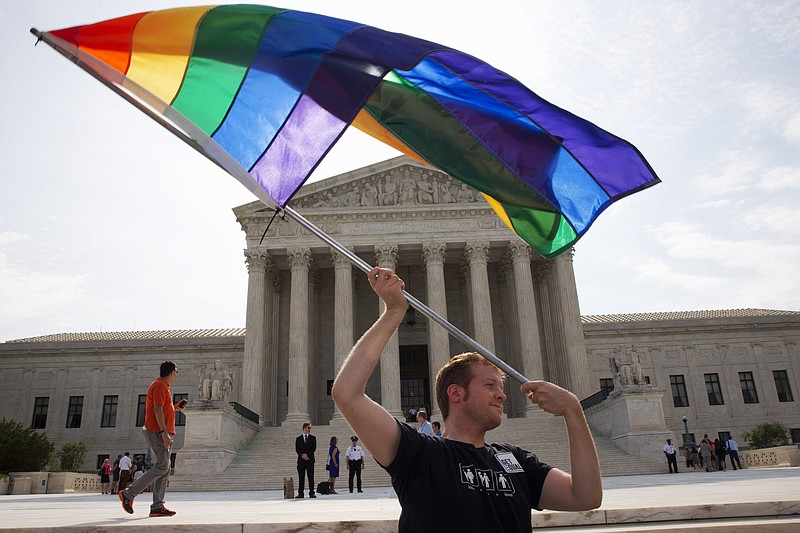In October 1962, our country approached the brink of nuclear war after the Soviet Union placed nuclear missiles in Cuba that were aimed at our cities. It was an incredibly tense time. The Joint Chiefs of Staff encouraged President Kennedy to attack Cuba immediately. Fortunately, Kennedy kept his wits and responded with a naval blockade of Cuba backed by the threat of air strikes and an invasion. The Soviet Union blinked, and nuclear war was narrowly averted. President Kennedy showed incredible leadership in calmly telling his nearly hysterical security advisers to remember, "the judgments of history seldom coincide with the tempers of the moment."
Those words offer good advice for the hysteria enveloping our nation this summer. On June 26, "five lawyers" (Chief Justice Roberts' words, not mine) on the Supreme Court opted to redefine marriage from the only definition the civilized world has ever known marriage to be: one woman and one man.
Most of us understand that we are a nation of laws. Though we might disagree vehemently with the Supreme Court decision, we are not rioting and burning down our cities. Instead, we are wrestling with how to deal with this dreadful decision on a personal basis: intellectually, spiritually and culturally.
Three main points stand out. First, the Supreme Court is far removed from mainstream American society. Geographically, they are isolated along the coasts, primarily the Northeast. Stephen Breyer and Anthony Kennedy are from California. Ruth Bader Ginsburg, Elena Kagan, John Roberts, and Sonia Sotomayor are New Yorkers. Samuel Alito and Antonin Scalia are Jersey boys. Only Georgia's Clarance Thomas escaped the elite Northeast/California orbit. All of them attended either Harvard or Yale law schools. Of the nine justices, six are Catholic; three are Jewish. There is not one Protestant, Midwesterner or non-Ivy Leaguer among them. How can judges from such a sliver of society objectively judge our laws from their incredible ivory tower?
Second, the decision has let the homosexual topic out of the closet. Ministers and others are openly discussing homosexuality as never before in the wake of the decision. On moral issues, Christians answer to a far higher power than the Supreme Court. However, the moral umbrella extends far beyond Christian theology. Many non-believers also recognize the slippery moral slope down which we are sliding.
For instance, what are unnatural sexual acts? How do we define perversion? Who are we to castigate any previously considered immoral sexual act: adultery, polygamy, incest, pedophilia or even bestiality? Are these relationships also legitimate expressions of love under the broad ruling of the Supreme Court? Do they warrant legalization and legitimacy?
Finally, I realize how far we have come as a nation from our Founding Fathers' intentions. They were students of the Age of Enlightenment. In every subject - politics, government, science, history, economics and religion - students of the era searched for a natural order. Jefferson's opening words in our Declaration of Independence reflect this quest: "When in the Course of human events, it becomes necessary for one people to dissolve the political bands which have connected them with another, and to assume among the powers of the earth, the separate and equal station to which the Laws of Nature and of Nature's God entitle them, a decent respect to the opinions of mankind requires that they should declare the causes which impel them to the separation."
I cringe to think how Jefferson and his peers would view the Supreme Court decision with respect to "the Laws of Nature and Nature's God." We, too, will realize we are attempting to make the unnatural natural, and eventually we will see it for the horrible mistake it is, no matter what five liberal lawyers try to tell us. To paraphrase President Kennedy, the judgment of history will certainly not coincide with the temper of the summer of 2015.
Roger Smith, a local author, is a frequent contributor to the Times Free Press.
